Yes, olive oil is one of the healthiest fats you can eat — and science strongly supports it.
Rich in monounsaturated fats and powerful antioxidants, olive oil can protect your heart, brain, and overall health when used correctly. Understanding its full benefits helps you make better dietary choices and improve long-term wellness.
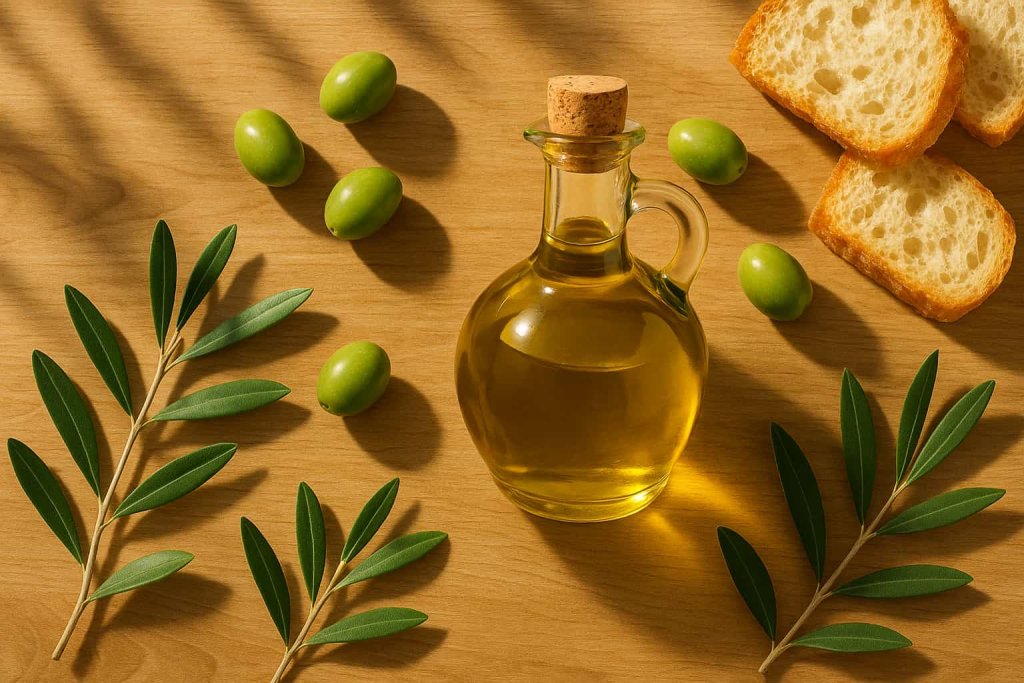
In this guide, we’ll break down the proven health benefits, how to choose and use olive oil, and important precautions to know — all based on the latest research and expert sources from Harvard Health, Healthline, and UC Davis.
What Is Olive Oil?
Olive oil is a natural oil extracted from olives — the fruit of the olive tree (Olea europaea).
The most beneficial type is extra-virgin olive oil (EVOO), which is cold-pressed and minimally processed, preserving its natural antioxidants, vitamins (E and K), and phenolic compounds.
There are three main grades:
| Type | Processing | Best Use |
|---|---|---|
| Extra Virgin Olive Oil (EVOO) | Cold-pressed, unrefined, rich in polyphenols | Drizzling, salad dressing |
| Virgin Olive Oil | Slightly processed | Cooking and sautéing |
| Refined (Light) Olive Oil | Chemically treated, lower nutrients | High-heat frying or baking |
According to the UC Davis Olive Center (2024), authentic EVOO contains more than 30 phenolic compounds with antioxidant and anti-inflammatory effects.
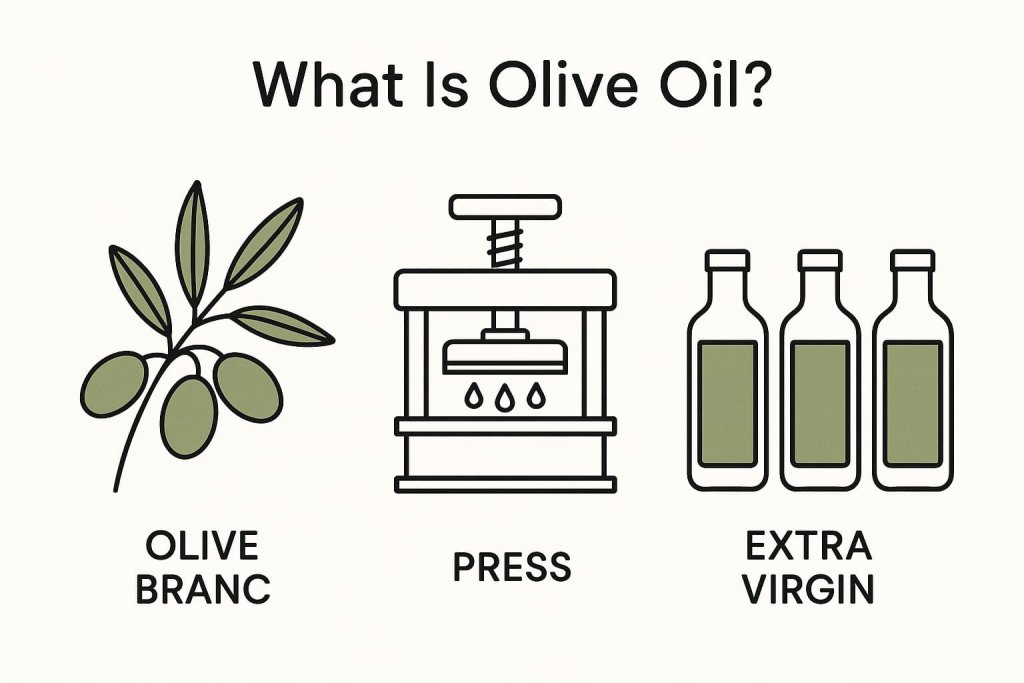
Nutritional Profile of Olive Oil
Before exploring the benefits of olive oil, it’s essential to understand what makes it nutritionally powerful.
According to the USDA FoodData Central (2025) and UC Davis Olive Center (2024), olive oil is composed mainly of heart-healthy monounsaturated fats and contains valuable vitamins and plant antioxidants known as polyphenols. These nutrients form the scientific foundation behind its well-documented health effects.
Olive Oil Nutrition Facts (Per 100g)
| Nutrient | Amount | Health Role |
|---|---|---|
| Calories | ~884 kcal | High energy density; provides fuel for body functions. |
| Total Fat | ~100 g | Almost entirely composed of healthy fats. |
| Monounsaturated Fat (Oleic Acid) | ~73 g | Improves heart health, lowers LDL, and supports insulin sensitivity. |
| Polyunsaturated Fat (Omega-6 & Omega-3) | ~10.5 g | Supports cell membrane health and hormone function. |
| Saturated Fat | ~13.8 g | Naturally present in small amounts; safer than in animal fats. |
| Vitamin E (Alpha-Tocopherol) | ~14.4 mg | Acts as a potent antioxidant, protecting cells from oxidative damage. |
| Vitamin K (Phylloquinone) | ~60 µg | Essential for blood clotting and bone strength. |
| Polyphenols & Antioxidants (Oleuropein, Hydroxytyrosol, Oleocanthal) | 50–500 mg/kg (varies by quality and freshness) | Reduces inflammation, supports immunity, and protects against chronic diseases. |
Source: USDA FoodData Central, 2025 and UC Davis Olive Center, 2024.
Key Insights from Research
- High in monounsaturated fats: Olive oil contains primarily oleic acid, which is resistant to oxidation and helps lower harmful LDL cholesterol while supporting healthy HDL levels.
- Rich in antioxidants and polyphenols: Extra virgin olive oil (EVOO) contains hundreds of natural plant compounds that protect cells from free radicals and inflammation.
- Contains vitamins E and K: These fat-soluble vitamins enhance immune function, protect skin, and maintain strong bones.
- Low in omega-6: Compared to other vegetable oils, olive oil has a balanced fatty acid ratio, which helps reduce inflammation and metabolic risk.
- Free of trans fats: Naturally produced olive oil contains no industrial trans fats, making it one of the cleanest fats for everyday use.
Choosing the Healthiest Olive Oil
For the highest nutrient and antioxidant levels, select cold-pressed extra virgin olive oil.
The UC Davis Olive Center (2024) confirms that EVOO retains significantly higher polyphenol content and vitamin E than refined or light olive oils. Freshness and storage conditions also matter—polyphenol levels decrease over time and with heat or light exposure.
Quick tips:
- Check for harvest or “best by” date (use within 18 months).
- Buy from reputable producers certified by the California Olive Oil Council (COOC) or International Olive Council (IOC).
- Store in a dark, cool place to preserve nutrients and flavor.
10 Proven Health Benefits of Olive Oil
1. Supports Heart and Cardiovascular Health

Olive oil is one of the few dietary fats proven to improve cardiovascular outcomes.
A large Harvard T.H. Chan School of Public Health (2022) study reported that individuals consuming over 7 grams (~½ tablespoon) of olive oil daily had a 19% lower risk of death from any cause — particularly heart-related conditions such as coronary disease and stroke (Harvard Health Publishing).
How olive oil benefits the heart:
- Raises HDL (“good”) cholesterol levels
- Lowers LDL (“bad”) cholesterol and prevents its oxidation
- Reduces blood pressure and arterial stiffness
- Improves endothelial function through oleic acid and antioxidant polyphenols
Replacing butter or margarine with olive oil just a few times per week can significantly improve cholesterol levels and reduce inflammation, according to the American Heart Association. (American Heart Association, 2020)
2. Reduces Inflammation Naturally
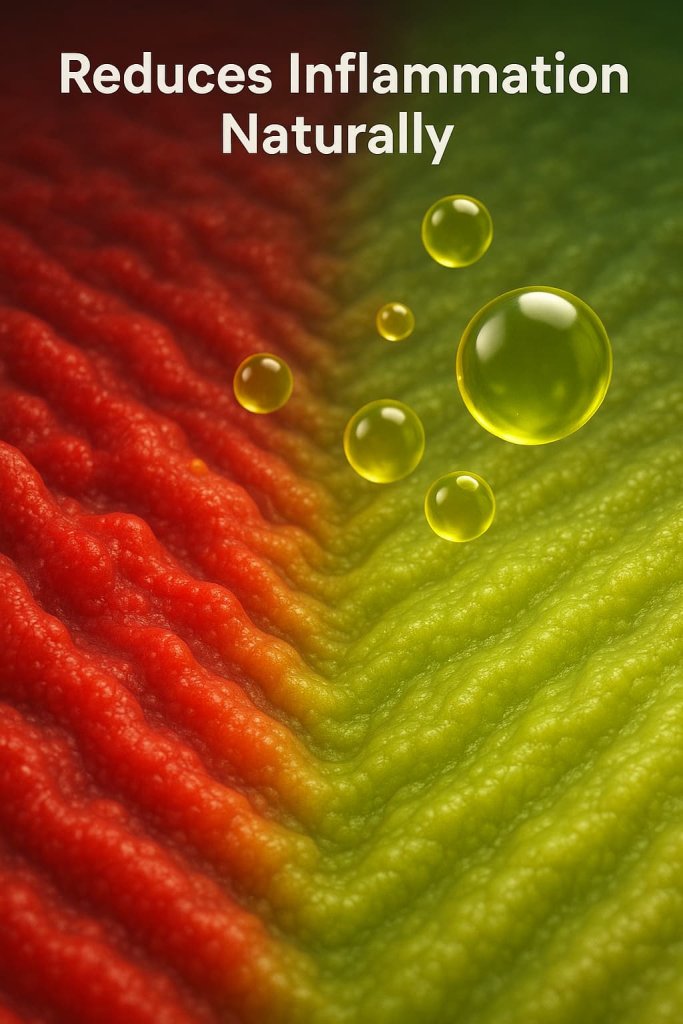
Olive oil contains oleocanthal, a bioactive compound that exhibits effects similar to mild doses of ibuprofen.
A study published in the Journal of Nutritional Biochemistry (2023) showed that regular intake of extra virgin olive oil (EVOO) can lower inflammatory biomarkers such as C-reactive protein (CRP) and interleukin-6.
This anti-inflammatory action helps reduce chronic inflammation — a leading factor in heart disease, arthritis, diabetes, and aging.
The phenolic compounds in EVOO act as antioxidants, protecting cells from oxidative stress and slowing the onset of chronic illness (Healthline).
3. Helps Maintain Healthy Cholesterol Levels
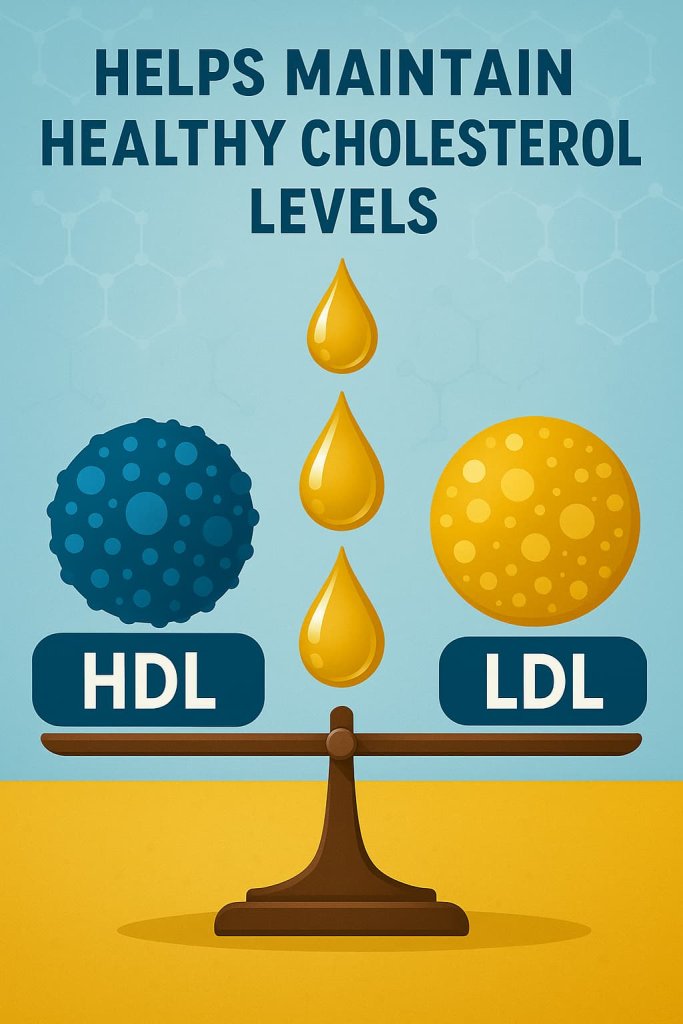
Unlike saturated or trans fats, olive oil maintains a balanced lipid profile that supports cardiovascular health.
Meta-analyses summarized by UC Davis Health (2024) reveal that replacing animal fats with olive oil can:
- Lower total cholesterol by 8–10%
- Decrease LDL oxidation, reducing plaque formation
- Preserve HDL levels for better lipid transport
EVOO offers superior protection due to its antioxidant phenols, which stabilize lipids and prevent arterial inflammation (UC Davis Olive Center).
4. Protects Brain Function and Cognitive Health

The Mediterranean diet, rich in olive oil, has long been linked to sharper cognitive performance and lower dementia risk.
A 2024 study in JAMA Network Open found that people who consumed more olive oil had a 28% lower risk of death from dementia-related causes compared to those who rarely used it (JAMA Network Open).
Mechanisms behind the brain benefits:
- Antioxidants in olive oil shield neurons from oxidative damage
- Polyphenols support synaptic plasticity and healthy brain signaling
- Oleic acid enhances cerebral blood flow and nutrient delivery
These findings reinforce olive oil’s role as a cornerstone of brain-protective nutrition.
5. Supports Weight Management and Metabolic Health
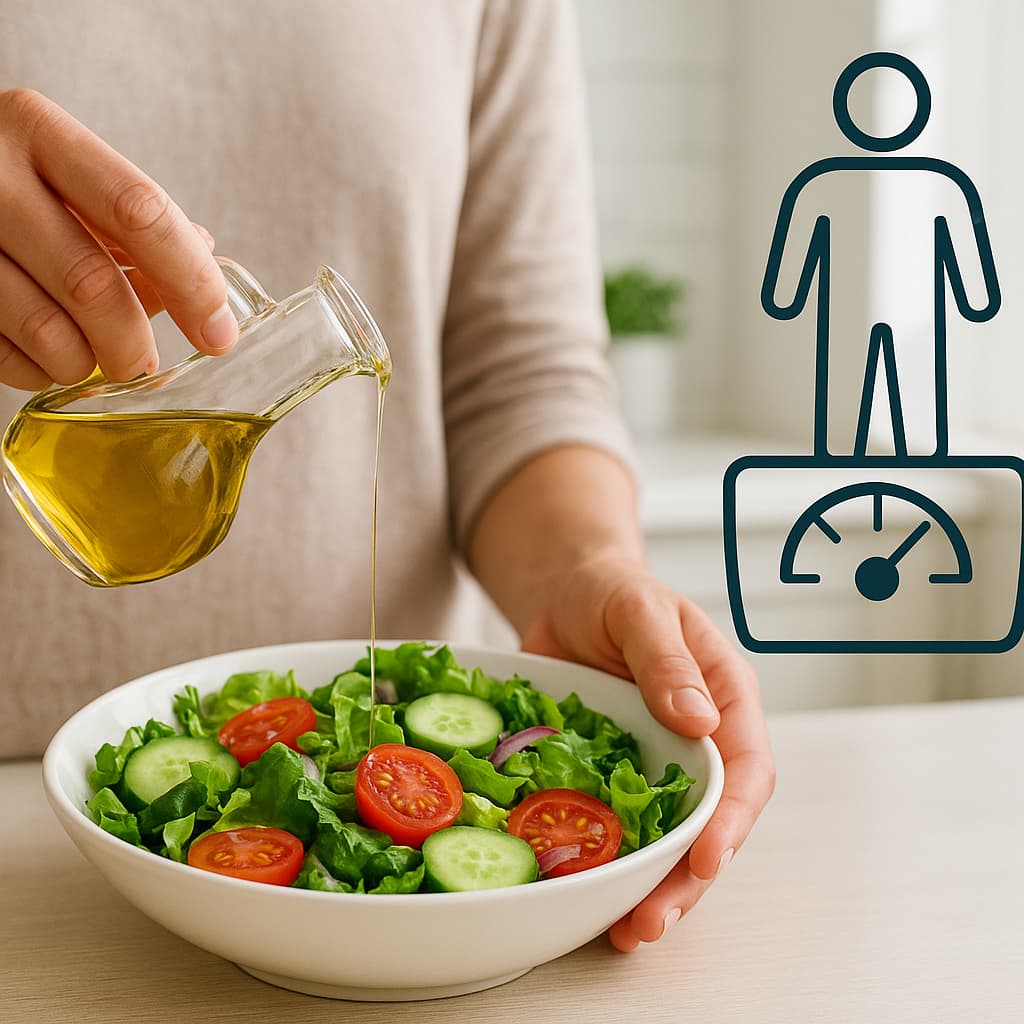
Contrary to popular belief, healthy fats like olive oil do not cause weight gain when consumed moderately.
Clinical trials show that olive oil can increase satiety hormones and improve insulin sensitivity, helping maintain a healthy body weight and metabolism.
A balanced diet including 1–2 tablespoons of olive oil daily promotes fullness and reduces cravings for refined carbohydrates.
The Harvard School of Public Health emphasizes that substituting refined fats or sugary calories with olive oil contributes to better metabolic health and reduced obesity risk.
6. Promotes Digestive and Gut Health

Olive oil supports a balanced gut microbiome and optimal digestion.
Research published in Frontiers in Nutrition (2023) found that regular EVOO intake increases beneficial gut bacteria such as Bifidobacteria and Lactobacillus while reducing inflammatory strains.
Olive oil also:
- Stimulates bile flow for efficient fat digestion
- Protects the stomach lining against ulcers and gastritis
- Eases mild constipation by softening stool consistency
These properties make it a gentle, natural aid for digestive comfort and overall gut wellness (Cleveland Clinic).
7. May Lower Risk of Type 2 Diabetes
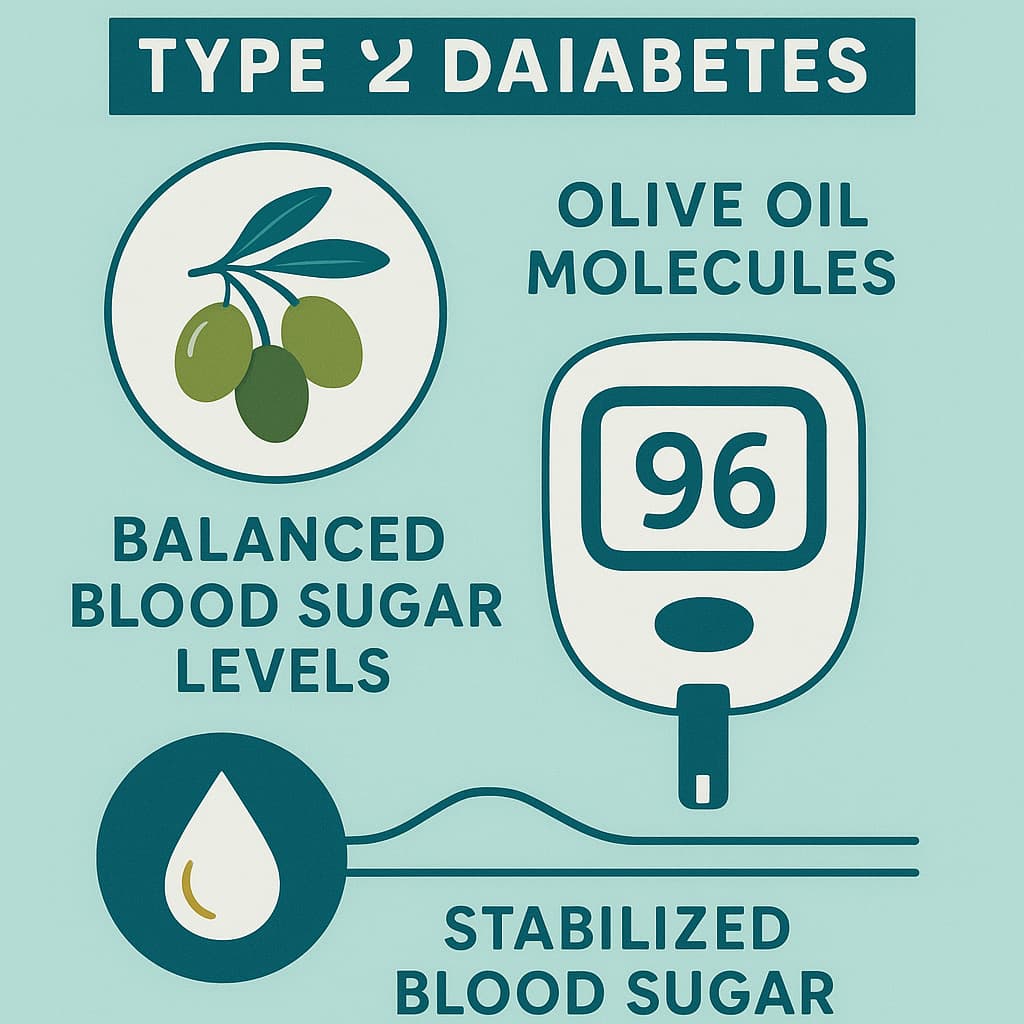
Consistent olive oil consumption can help regulate blood sugar and insulin function.
A 2024 review in Diabetologia concluded that individuals following olive-oil-rich diets experienced 13–15% lower diabetes risk compared with those eating minimal amounts.
The unsaturated fats in olive oil improve glucose uptake and reduce post-meal insulin spikes, enhancing long-term metabolic control (Diabetologia Journal).
8. Supports Skin and Hair Health
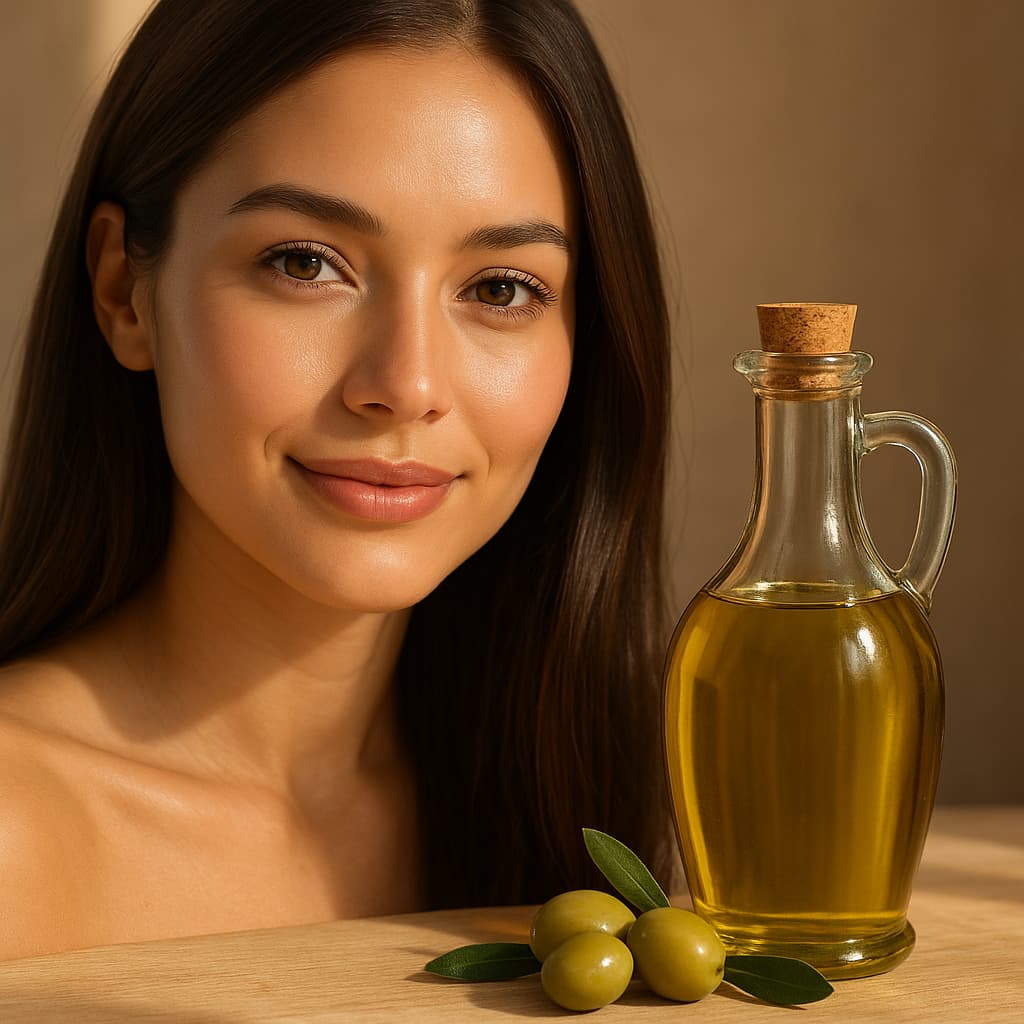
Olive oil is naturally rich in vitamin E, squalene, and phenolic antioxidants that nourish the skin from within.
These compounds help:
- Protect against UV-induced oxidative damage
- Maintain moisture, elasticity, and barrier integrity
- Reduce visible signs of aging like fine lines and dryness
For hair, small topical amounts can smooth the cuticle, add shine, and minimize breakage — though excessive use may weigh hair down.
Dermatology Times (2024) notes that topical olive oil also has mild antimicrobial properties beneficial for dry scalp or eczema.
9. May Protect Against Certain Cancers

Polyphenols such as oleuropein and hydroxytyrosol have demonstrated anti-tumor properties in laboratory studies.
A 2024 review in the International Journal of Molecular Sciences linked higher olive oil consumption with lower risks of breast, colorectal, and digestive cancers, largely due to its antioxidant and anti-inflammatory mechanisms (MDPI IJMS).
While research is ongoing, evidence suggests that incorporating EVOO into a plant-rich diet may provide synergistic protection against oxidative DNA damage.
10. Boosts Longevity and Overall Wellbeing

Olive oil consumption is consistently correlated with longer lifespan and reduced chronic disease mortality.
A Harvard Health (2022) analysis of over 90,000 participants found that those who regularly used olive oil instead of animal fats had significantly lower death rates from cardiovascular, neurodegenerative, and respiratory diseases.
The combined effects of its antioxidants, monounsaturated fats, and anti-inflammatory compounds contribute to healthy aging, vitality, and resilience.
Incorporating olive oil as your primary cooking fat is one of the simplest, evidence-based steps toward long-term wellness (Harvard Health Publishing).
How to Choose and Use Olive Oil Correctly
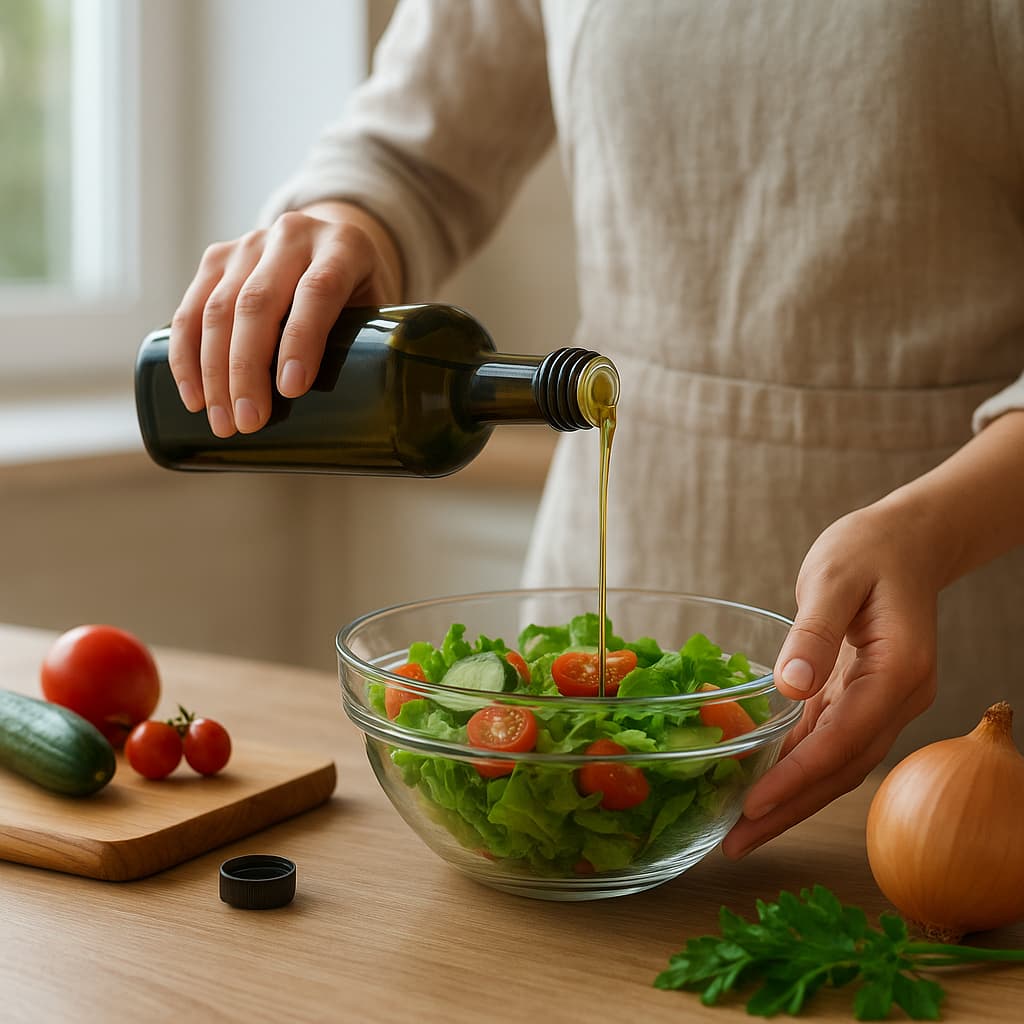
Choosing the right olive oil and using it properly can make a big difference in both taste and health impact. Studies show that the quality and freshness of olive oil determine how much of its antioxidants and polyphenols your body actually absorbs (UC Davis Olive Center, 2024).
How to Choose High-Quality Olive Oil
Follow these expert-backed guidelines:
- Go for Extra Virgin Olive Oil (EVOO):
It’s the least processed form and retains the highest amount of beneficial antioxidants and monounsaturated fats. - Check for Certification:
Look for seals like California Olive Oil Council (COOC), International Olive Council (IOC), or North American Olive Oil Association (NAOOA) — these indicate purity and authenticity. - Look for the Harvest or “Best By” Date:
Olive oil loses potency over time. Choose bottles harvested within the last 12–18 months. - Use Dark Glass Bottles:
Exposure to light and heat degrades antioxidants and flavor. Avoid clear plastic containers. - Smell and Taste Test:
High-quality olive oil should smell fresh, grassy, or fruity — never rancid or metallic. - Buy in Smaller Quantities:
Freshness matters. Purchase smaller bottles if you use olive oil slowly.
How to Use Olive Oil for Best Results
| Purpose | Recommended Use | Tips |
|---|---|---|
| Cooking | Use for sautéing, baking, and light frying (up to 410°F / 210°C) | EVOO has a stable smoke point due to antioxidants. |
| Salads & Dressings | Drizzle raw on salads or vegetables | Enhances nutrient absorption, especially vitamins A, D, E, K. |
| Health Supplement | Take 1–2 tablespoons daily | Prefer morning use with breakfast for better digestion. |
| Skin & Hair Care | Apply small amounts topically | Helps hydrate and protect skin; patch-test before use. |
Pro Tip: Pair olive oil with antioxidant-rich foods like tomatoes, leafy greens, and fish to maximize nutrient synergy (Harvard Health Publishing).
Possible Side Effects and Precautions
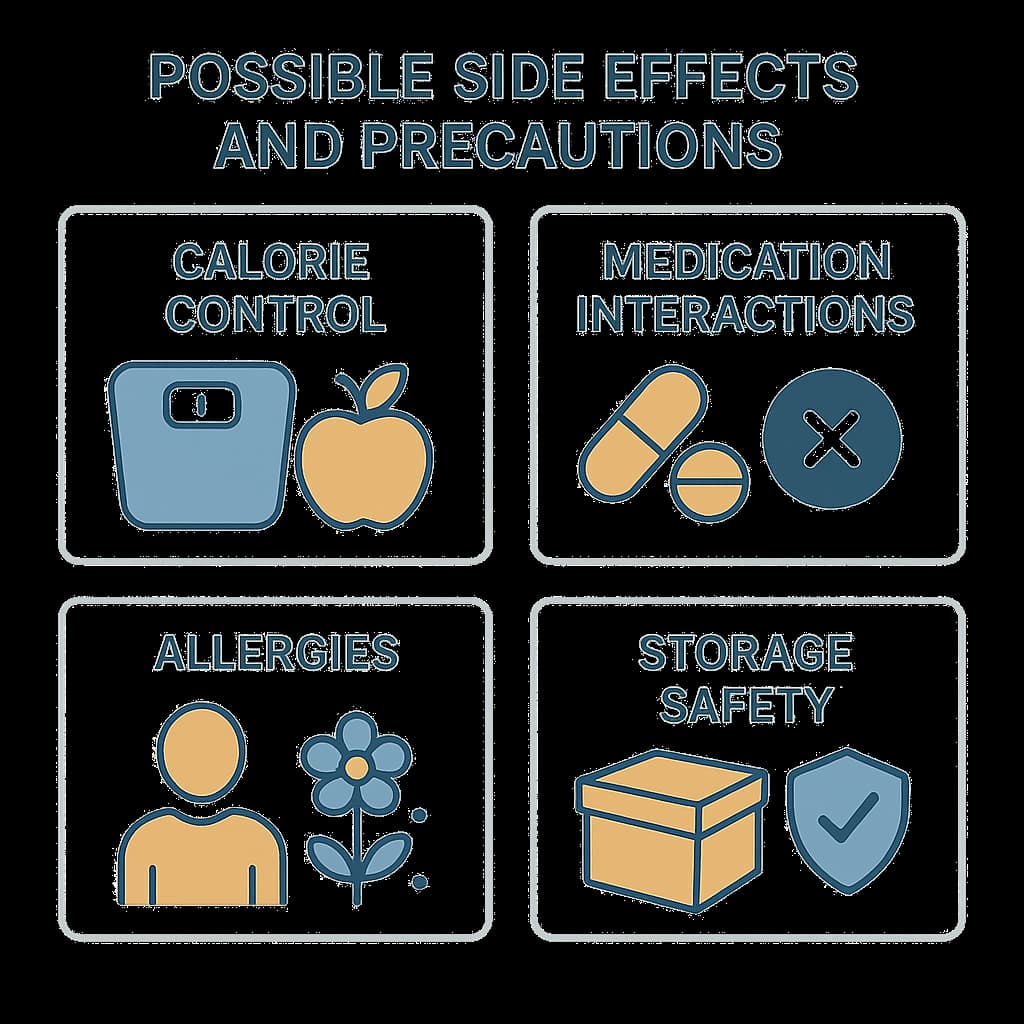
Olive oil is safe for most adults when consumed in moderation, but certain precautions are essential to ensure medical transparency and protect users following YMYL guidelines.
1. Calorie Density and Weight Gain
Olive oil is calorie-rich — 1 tablespoon provides around 120 calories. Excessive intake without dietary balance can contribute to weight gain, especially in low-activity individuals.
2. Digestive Effects
In large amounts (over 3 tablespoons per day), olive oil may cause loose stools or mild diarrhea due to its natural laxative properties. Start with small servings and increase gradually.
3. Drug Interactions
People taking blood thinners (like warfarin) or blood pressure medications should consult a doctor before increasing olive oil intake. The oil’s mild blood-thinning effect can enhance medication potency (WebMD).
4. Allergic Reactions
Although rare, some individuals allergic to olives may experience skin irritation or mild digestive discomfort. Perform a patch test before using olive oil topically.
5. Storage and Oxidation
Olive oil oxidizes when exposed to heat, light, or air, leading to nutrient loss and rancidity. Always store in a cool, dark place, tightly sealed, and use within 18 months of harvest.
6. Pregnancy and Breastfeeding
Olive oil is safe for pregnant and breastfeeding women when used as part of a balanced diet. It supports fetal brain development and maternal cardiovascular health (Cleveland Clinic).
Frequently Asked Questions (FAQ)
1. How much olive oil should I use daily?
Most studies recommend 1–2 tablespoons per day for optimal benefits. This provides enough healthy fats and antioxidants without adding excessive calories.
2. Is extra virgin olive oil better than light olive oil?
Yes. Extra virgin olive oil (EVOO) is cold-pressed and unrefined, retaining the most antioxidants and polyphenols. Light olive oil is refined and lower in nutrients.
3. Can I cook with olive oil?
Absolutely. EVOO remains stable up to about 410°F (210°C), making it suitable for most home cooking methods like roasting, sautéing, and baking.
4. Does olive oil help with weight loss?
Yes, when used as a replacement for butter or refined oils, olive oil supports satiety and metabolism, helping maintain a healthy weight (Healthline, 2025).
5. How long does olive oil last?
Typically 18–24 months from the harvest date. Store in a dark bottle, away from heat, to preserve freshness.
6. Can olive oil improve skin and hair health?
Yes. Its vitamin E and squalene content help retain moisture, protect against UV damage, and maintain elasticity.
7. Is olive oil safe for people with diabetes?
Yes. Olive oil helps improve insulin sensitivity and regulate blood sugar levels, making it beneficial for individuals managing type 2 diabetes.
Conclusion
Olive oil is far more than a cooking staple — it’s a scientifically validated health ally.
Backed by decades of research, this golden oil supports heart health, brain function, skin vitality, and metabolic balance, all while adding rich flavor to your meals.
When choosing olive oil, go for extra virgin, cold-pressed varieties in dark bottles, and use them both for cooking and raw dishes to unlock full nutritional potential.
In moderation — just 1–2 tablespoons daily — olive oil can transform your diet, supporting longevity and overall wellness.
Start today — make olive oil your daily source of nourishment and heart health.
References
- Harvard Health Publishing (2022) – High Olive Oil Consumption Associated with Longevity
→ https://www.health.harvard.edu/staying-healthy/harvard-study-high-olive-oil-consumption-associated-with-longevity
Supports heart health, longevity, and overall mortality reduction from daily olive oil use.
- UC Davis Olive Center (2024) – Olive Oil’s Health Benefits and Why You Should Add It to Your Diet
→ https://health.ucdavis.edu/blog/good-food/olive-oils-health-benefits-and-why-you-should-add-it-to-your-diet/2024/04
Provides current data on olive oil’s antioxidants, nutritional composition, and proper use.
- JAMA Network Open (2024) – Consumption of Olive Oil and Risk of Dementia-Related Mortality
→ https://jamanetwork.com/journals/jamanetworkopen/fullarticle/2818362
Key evidence for cognitive and brain health benefits of regular olive oil intake.
- USDA FoodData Central (2025) – Olive Oil Nutrient Data (Foundation Foods)
→ https://fdc.nal.usda.gov/food-details/170554/nutrients
Official source for olive oil’s nutrient composition — vitamin E, K, and fat breakdown.
- International Journal of Molecular Sciences (2024) – Extra Virgin Olive Oil and Metabolic Diseases: A Comprehensive Review
→ https://www.mdpi.com/1422-0067/25/15/8117
Explains the biochemical role of olive oil’s polyphenols in reducing inflammation, metabolic syndrome, and cancer risk.
